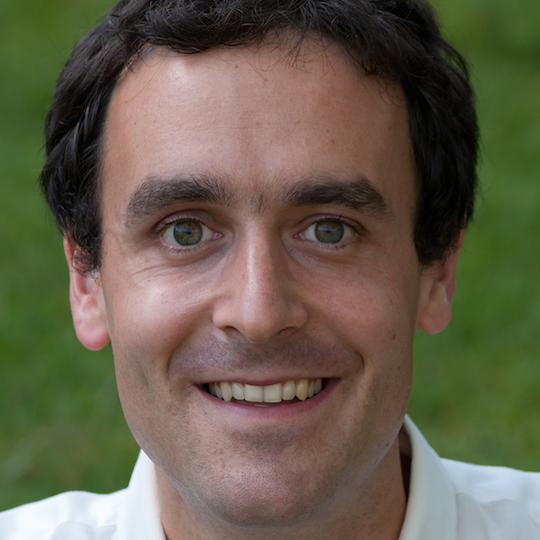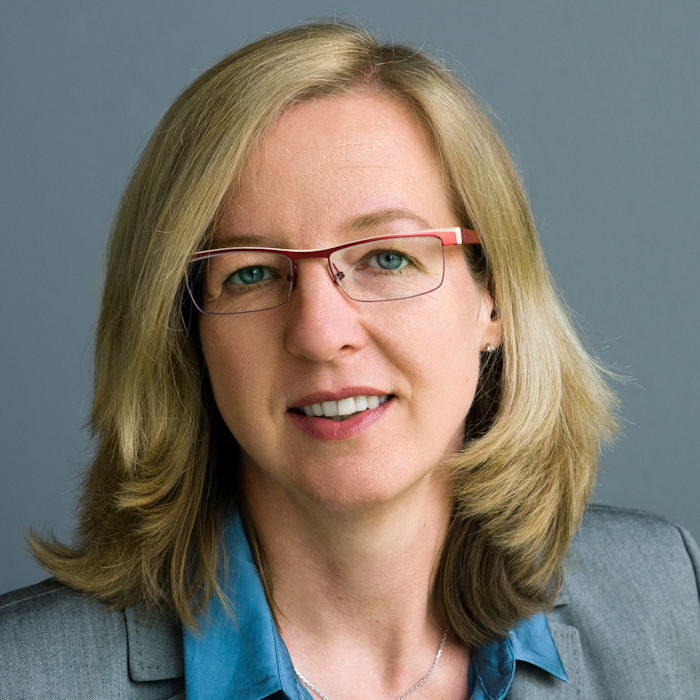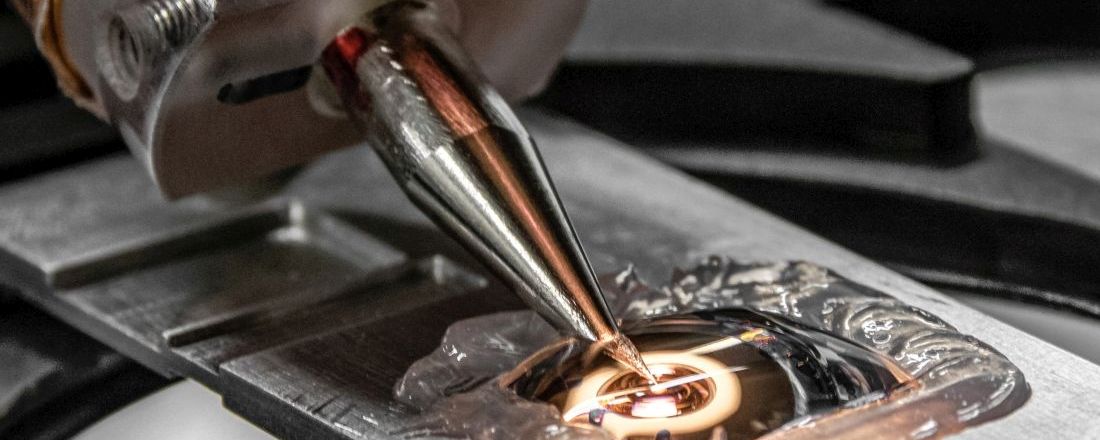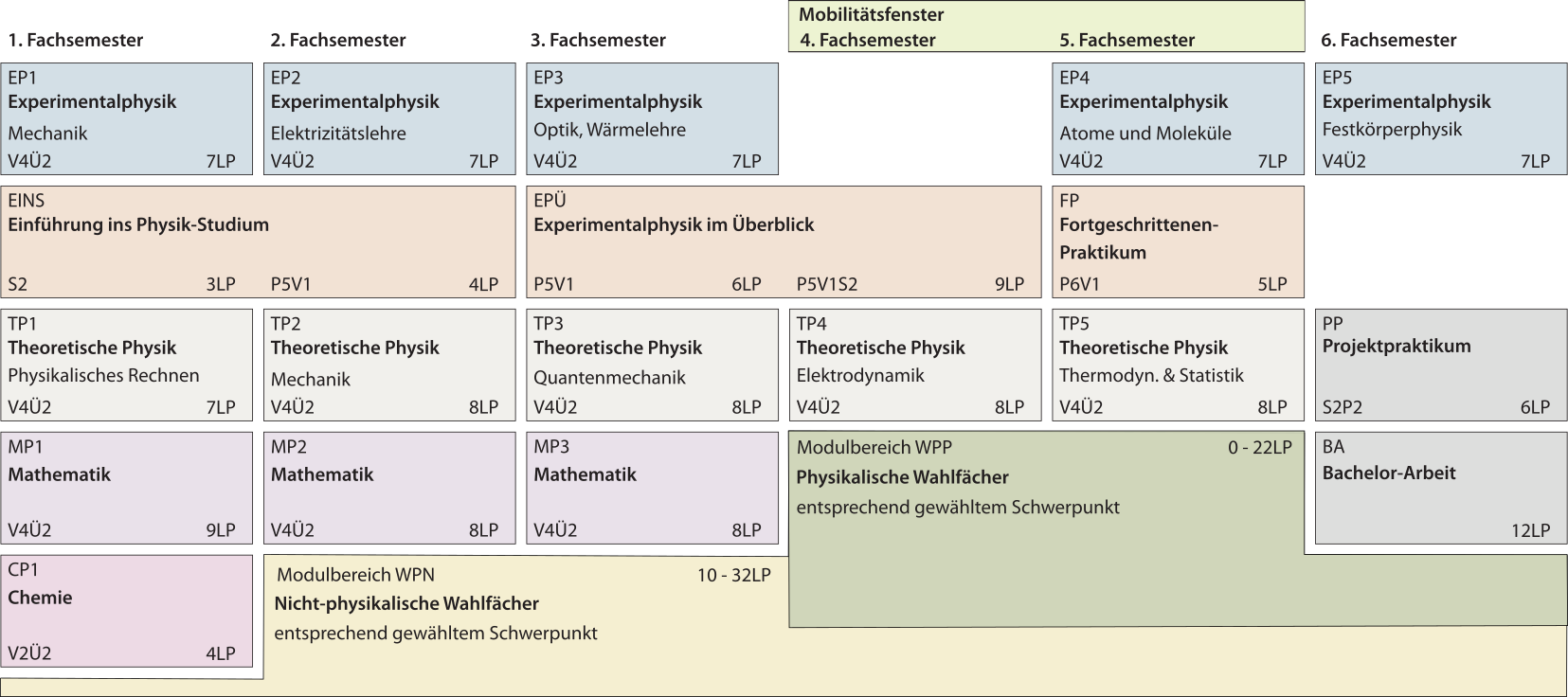Bachelor
The Bachelor of Science degree programme in Physics at the University of Bayreuth is close to research and at the same time carrer-oriented. It provides a broad general education in Physics and leads to a Bachelor of Science degree (B.Sc.) in six semesters. The degree programme regularly achieves top positions in the Germany-wide CHE ranking. Among other things, the University of Bayreuth received 4.6 out of 5 stars in the "General study situation" category in the 2024 student survey, the best rating of all physics bachelor's degree programmes in Germany.
This page describes the course for students starting in the winter semester 2024/25. The previous version can be found here.
Please note that almost all lectures are held in German and a B2 language certificate is required for enrollment.
Compulsory and elective areas
The Bachelor's degree program in Physics is divided into a compulsory area comprising 148 credit points (CP) and an elective area comprising 32 CP. The compulsory area is divided into
- Module: Introduction to studying physics
- Experimental physics with the physics practical courses
- Theoretical physics
- Mathematics and Chemistry
- Bachelor's thesis with a project internship
The following diagram shows the modules included in the compulsory area and a suggestion for their chronological sequence in the full-time course. A curriculum for part-time study can be found here.
In the elective area, you can set your own focus by combining modules from physics and other subjects yourself. We distinguish between the following 5 specializations:
- General physics The focus here is on the core subjects of physics. Students tend to take more modules from physics and fewer modules from other subjects.
- Biological physics Students with a particular interest in the physical principles of biological processes choose this specialization. They take modules in biophysics, biochemistry and biology. The number of modules in physics is slightly lower.
- Technical Physics You will learn about practically relevant physical techniques. You can also acquire basic knowledge of economics and engineering as well as patent law. In return, you will generally choose a smaller number of modules from the field of physics.
- Environmental Physics You will learn about the physical processes that determine the processes in our environment. You will use physical laws to quantitatively describe the processes in the atmosphere, the hydrosphere and the soil. You can specialize further in ecological modelling, meteorology & soil physics or hydrology. As there is also a lot of physics involved here, you can choose not to take any physics electives at all.
- Physics & Philosophy In this specialization, you have the opportunity to delve deeper into the philosophical foundations of epistemology - and therefore also of physics. You can take various modules from the field of philosophy. If you wish, you can also do without the physics electives altogether.
The total number of credit points in the elective area must always be at least 32 CP. The division between physical and non-physical electives differs depending on the chosen specialization, as shown in the following diagram. Additional courses can of course also be attended.
Choice of specialization When you register for the examination for your first module in one of the elective areas, you determine your specialization. If you wish to change your specialization at a later date, you must inform the Examination Office in writing.
Electives in the field of physics
Here you can choose from the following modules:
- Biophysics A (5 CP)Hide
-
- Structure and function of DNA and proteins
- Transport mechanisms in living cells
- Mechanical properties of cells
- Physics of nerve cells
Offered regularly in the summer semester.
- Modern Optics (5 CP)Hide
-
- Wave optics
- Gaussian beams
- Fourier optics
- polarization
- Quantum optics / photon optics.
- Examples from integrated optics / fiber optics, negative refractive index and metamaterials, photonic crystals, nanooptics, optical components, nonlinear optics.
Offered regularly in the winter semester.
- Microcontroller and Electronics (5 CP)Hide
-
- Basics of computer-aided data acquisition
- Programming a microcontroller
- Construction of a microcontroller system
- Elementary algorithms of digital signal processing
Offered regularly in the winter semester.
- Computing (5 CP)Hide
-
- General principles of computer simulations in physics
- Numerical basics: machine accuracy, systems of equations, integration
- Partial differential equations
- Nonlinear optimization
- Parallelization
Offered regularly in the winter semester.
- Crystallography (5 CP)Hide
-
- Symmetry of crystalline solids
- Symmetry of physical properties of crystalline solids
- Basics of X-ray diffraction
- Modern methods for crystal structure determination
- Computer simulation of many particle systems (5 CP)Hide
-
- Microscopic many particle models
- Physical observables
- Development of simulation codes
- Numerically calculated physical quantities
- Visualization of numerical properties
- Microscopic many particle models
- Advanced Physical Computing (5 CP)Hide
-
- Advanced calculation methods
- Application of higher analytical and symbolic solution methods
- Computer algebra systems
- Visualization of results
- Advanced calculation methods
- Applied Theoretical Physics (5 CP)Hide
-
- Learning modern theoretical methods on the basis of real problems
- Divided into four projects on changing current topics
- Development, implementation and analysis of small simulation projects and/or analytical calculations
Offered regularly in the summer and winter semesters.
- Learning modern theoretical methods on the basis of real problems
- Advanced practical course part 2 (5 CP*)Hide
-
- Identification of feasible questions
- Planning, conducting and evaluating complex experiments on modern physics topics
- Deepening your understanding of physics by means of practical realization and quantitative measurement of physical effects
Here you can complement the compulsory part of the advanced practical course and carry out further experiments. Like FP1, this module FP2 is not graded and is offered regularly in September.
- Physikalisches Programmieren (3 LP*)Hide
-
- Learning a higher programming language
- Ability to build structured software programs
- Development of simple numerical algorithms for physical problems
- Data types, control structures, functions, classes and objects
- Finite differences, numerical integration, linear equation systems, time-step methods
Offered irregularly in the summer semester. This module is ungraded.
Compulsory elective subjects in a non-physics direction
All regularly selectable modules can be found in CampusOnline / cmlife. Other modules that are not listed or are only intended for a different specialization can be selected upon individual application. It is important that the focus remains recognizable. Courses offered by the Language Center, for example in preparation for a stay abroad, are recognized upon application if they all concern the same language. Otherwise, you are completely free to choose your own elective modules. Below we provide information on a sensible chronological sequence. If you have any questions about individual study planning, please contact the program moderator. You will find their contact details at the bottom of this page.
Here is a preview of some of the electives available.
- BiologyHide
-
- Biochemistry for Physicists I - III
- Bioinformatics
- Genetics
- Biochemistry for Physicists I - III
- EngineeringHide
-
- Design and manufacturing for physicists
- Material sciences
- Introduction to materials science for physicists
- Introduction to the design and manufacturing for physicists
- Fluid mechanics
- Basics of mechatronics
- Machine tools
- Earth SciencesHide
-
- Ecology and modeling
- Modeling in geoecology
- Introduction to soil physics / hydrosphere / atmosphere
- Geoecological field practical course
- Practical meteorology
- PhilosophyHide
-
- Logic and argumentation theory
- Introduction to philosophical analysis
- Philosophy of Science I & II
- Seminar Theoretical Philosophy
- Seminar Practical Philosophy
- Logic and argumentation theory
- Computer ScienceHide
-
- Concepts of programming
- Programming in Java
- Computer architecture and computer networks
- Algorithms and data structures
- Multimedia Systems I
- Artificial intelligence
- MathematicsHide
-
- Mathematics on the computer
- Complex analysis
- Vector analysis
- Mathematics on the computer
- Business and EconomicsHide
-
- Introduction to general business administration
- Introduction to economics
- Statistical Methods I + II
- Microeconomics I + II
- European Integration
- Introduction to general business administration
- LawHide
-
- Patent law
- Patent law
- SoziologyHide
-
- Introduction to Sociology
- Introduction to Sociology
Current changes are announced in the elearning course "Aktuelles im Bachelorstudiengang Physik".
Mobility window
The 4th and 5th semesters can be used as mobility windows. A stay abroad is particularly easy to organize here, as only a few compulsory courses have to be taken. The overview seminar in the EPC module takes place every semester and can therefore be easily postponed. Another good time is the first two semesters of the Master's degree course.
Spending time abroad during your studies is a very enriching experience. A different country, a different language, a different (study) culture and a different range of modules offer exciting additions to your studies at the University of Bayreuth. However, a certain amount of preparation is required. Scholarships abroad often have to be applied for 12 months or more in advance. Proof of appropriate language skills is often required. Anyone planning a stay abroad should therefore inform themselves and prepare well in advance. Helpful contacts are the representative of the Institute of Physics for stays abroad, the study program moderators (see below) and the International Office (INO) of the University of Bayreuth.
Notes on the chronological order of the modules
The recommended sequence of compulsory modules is shown in the diagram at the top. You can deviate from this, e.g. for a stay abroad or if you have not passed a module examination, but should then consult with the program moderator in order to plan your studies optimally.
The elective modules in physics are independent of each other and can be taken in any combination and chronological order. Normally, you should only start with the elective modules in physics in the 4th semester, as otherwise you may lack the basics. If you would still like to take a module earlier, please speak to the respective lecturer or the program moderator.
The elective modules in non-physics subjects should also be taken in the 4th and 5th semesters, as there are fewer compulsory modules to complete. However, depending on the chosen specialization and desired modules, it may also make sense to take certain modules in earlier semesters.
- Chemistry The module CP1 'Chemistry for Physics Students 1' is compulsory. You can take the elective module CP2 'Chemistry for Physics Students 2' (6 CP) in the subsequent second semester. This consists of a lecture and a practical course. If you only want to attend the lecture, this is possible with the module 'Introduction to Chemistry II' (4 CP).
- Biochemistry The three-semester Biochemistry cycle begins in the summer semester. As long as you do not also want to take Part III, you can start in the 4th semester.
- Design and Strength of Materials The two-semester module begins in the winter semester. It is possible to start in the 3rd semester.
- Special Topics in Environmental Physics You should first attend suitable lectures in the 'Introduction to Soil Physics / Hydrology / Meteorology' series in order to then attend the more specialized modules of the specialization in the fifth semester and the field internship in the sixth semester.
- Philosophy A good overview of the philosophy modules can be found on the website of the Philosophy & Economics degree program. There you can also see which courses are offered in the individual modules. It makes sense to take the module 'G1 Logic and Argumentation Theory' first, preferably in the first semester. After that, it makes sense to take the module 'P1 Introduction to Philosophical Analysis I'. The seminar modules (with an asterisk in the abbreviation) cannot be taken before the corresponding lectures (without an asterisk).
Examinations and grades
The type, duration and organizational details of the examination are announced in the course at the beginning of the semester. Unless otherwise stipulated in the examination regulations, the form of examination for graded modules is either a written examination or an oral examination. The compulsory modules EINS, FP1 and PP are ungraded.
A best-of rule is applied when calculating the final Bachelor's grade: Only the highest graded modules of the marked sub-area are included in the calculation of the final grade. The sub-areas and modules weighted as indicated.
| Module Area / Module | CP | Best-of | Weight (%) |
|---|---|---|---|
| Experimental physics | 62 | 25 | |
| EINS Getting started in physics studies | 7 | — | ungraded |
| Area classical experimental physics | 21 | 2 of 3 | 8 |
| EP1 Mechanics | 7 | ||
| EP2 Elektricity & Magnetism | 7 | ||
| EP3 Optics & Thermodynamics | 7 | ||
| EPÜ Experimental physics in perspective | 15 | — | 9 |
| Area Structure of Matter | 14 | 1 of 2 | 8 |
| EP4 Atom & Molecular Physics | 7 | ||
| EP5 Solid State Physics | 7 | ||
| FP1 Advanced Practical Course 1 | 5 | — | ungraded |
| Theoretical Physics | 39 | 28 | |
| Area Theoretical Physics I | 23 | 2 of 3 | 18 |
| TP1 Physikalisches Rechnen | 7 | ||
| TP2 Mechanics | 8 | ||
| TP3 Quantum mechanics | 8 | ||
| Area Theoretical Physics II | 16 | 1 of 2 | 10 |
| TP4 Elektrodynamics | 8 | ||
| TP5 Thermodynamics & Statistical Physics | 8 | ||
| Mathematics und Chemistry | 29 | 12 | |
| Area Mathematics | 25 | 2 of 3 | 10 |
| MP1 Mathematics for students of physics 1 | 9 | ||
| MP2 Mathematics for students of physics 2 | 8 | ||
| MP3 Mathematics for students of physics 3 | 8 | ||
| CP1 Chemistry for students of physics 1 | 4 | — | 2 |
| Specialization | 32 | — | 19* |
| Thesis | 18 | 15 | |
| PP Project internship | 6 | — | ungraded |
| BA Bachelor Thesis | 12 | — | 15 |
| Sum | 180 | ||
Depending on the choice of modules, the effective weight of the specialization area can also be greater or less than 19%.
Credit points and time required
The course comprises 180 credit points, which are earned in 6 semesters, i.e. approx. 30 credit points per semester. The idea behind the credit points is to quantify the workload based on the time required. This is based on the assumption of a 40-hour week and 45 working weeks per year, in which the 2 × 30 credit points of two semesters are to be achieved. One credit point therefore corresponds to a workload of 30 hours, which is made up of attendance time in courses at the university and independent study time for preparation and follow-up work, working on exercises, etc. The time required during the lecture period is not insignificant and usually exceeds the 40-hour week!
Registration for practical courses
In order to reduce the workload during the lecture period, some practicals take place during the lecture-free period. Registration for an practical usually takes place towards the end of the previous lecture period, also in order to be able to allocate an appropriate number of assistants for supervision.
Find out in good time by checking the notices and, if necessary, registering for the e-learning course for the coming semester.
Issuing the degree certificate and transfer to the Master's program
CMlife cannot recognize whether a degree course has been completed, as further elective subjects can be taken or examined after the Bachelor's thesis has been submitted, for example. For this reason, the Bachelor's certificate must be explicitly requested in CMlife. The option appears as soon as all requirements have been met. Make sure that the allocation of modules in the elective area is correct at this point and confirm this to the Examinations Office by email.
Please note The Bachelor's degree program ends on the date of the certificate and not at the following semester end. You should already be enrolled in a Master's program at this point, otherwise you will no longer be considered a student until the next enrollment deadline. As soon as you have earned 150 CP in your Bachelor's degree program, you can enroll in the MSc Physics in parallel. In this case, you must submit your Bachelor's certificate by the end of the second semester of the Master's program.
Study counseling
Contact: bachelor.physik@uni-bayreuth.de

Prof. Dr. Markus Lippitz
Program advisor and head of the board of examiners
E-Mail: markus.lippitz@uni-bayreuth.de
Phone: +49 (0)921 / 55-3800
Room: 3.0.04 (BGI)

Prof. Dr. Stephan Gekle
Program advisor and member of the board of examiners
E-Mail: stephan.gekle@uni-bayreuth.de
Phone: +49 (0)921 / 55-4462
Room: 1.2.02.644 (NW II)

Prof. Dr. Anna Köhler
Program advisor and member of the board of examiners
E-Mail: anna.koehler@uni-bayreuth.de
Phone: +49 (0)921 / 55-2600
Room: 5.3.01.31 (NW I)

Dr. Christoph Reihl
Faculty advisor for teaching and learning
Servicestelle PULS
E-Mail: puls.mpi@uni-bayreuth.de
Phone: +49 (0)921 / 55-3224
Room: 3.2.00.345, Gebäude NW II (gegenüber S 78)
| Characteristics of the program | |
|---|---|
| Degree | Bachelor of Science (B.Sc.) |
| Start | winter term |
| Enrollment (Germans and EU citizens) | April to October here |
| Enrollment (Non-EU-citizens) | 15. July (winter term) here |
| Admission requirements | general or subject-related higher education entrance qualification or professional qualification Language skills: German B2 |
| Admission restrictions | none |
| Duration | 6 semesters |
| Particularities | Part-time study possible |
| Language | German |
Further information (only available in German)
Further counseling services
For all pupils who are interested in studying physics, the German Physical Society offers free access to an Online Mathematics Bridges Course OMB+.



